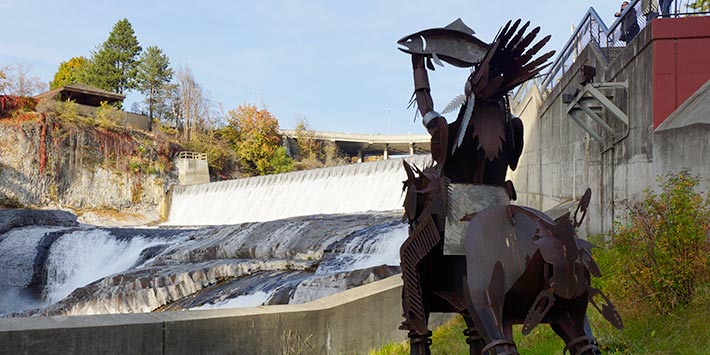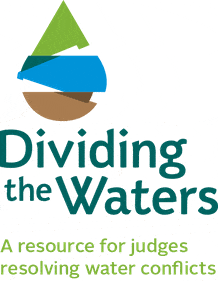
The National Judicial College offers its Dividing the Waters program to all judicial officers with complex water litigation on their docket. The Program connects judges, special masters and referees who preside over complex water litigation to the information and training resources they need to resolve some of the most difficult disputes about how to allocate and share this most precious and communal resource. Every 18 months, the program organizes a conference to provide judges with the latest legal developments and training on water conflicts.
This fall’s Dividing the Waters conference in Spokane, Washington, broke new ground for the NJC’s water law program. At Gonzaga University School of Law, the conference had a record number of participants and created training resources that will be available to judges with complex water cases. Video of the Water Law 101 webinar and a groundwater-biology exercise will make this Established Water Rights, Changing Conditions conference a valuable resource for water judges well into the future.
The Justice River Exercise
The conference’s most creative new resource is its Justice River Exercise on adjudicating groundwater and biology conflicts. With encouragement and funding from the State Judicial Institute, Dividing the Waters developed a hypothetical that required participants to exercise their judgment to determine how much water could be returned to a coastal stream to support declining numbers of salmon. The conference participants heard live testimony, including cross-examination, from a groundwater hydrogeologist and a salmon biologist. They then joined in small-group discussions to determine how to resolve the conflict between tribal fishery advocates and upstream irrigators. The NJC videotaped and will package that testimony with the expert reports and PowerPoint presentations for judges who seek to understand how to assess such expert testimony.
WA/CA Water Use and the Environment
The Spokane conference opened with panel discussions of emerging water law issues in the states of Washington and California. As reported in the DTW Network Note, the Washington Supreme Court has issued two water law decisions this year, as the state continues to confront the challenge of providing drinking water for a growing population and instream flows to protect the environment. Leading water judges and the Director of the Department of Ecology shared their views on how Washington has and will continue to overcome its water challenges.
With California struggling with one of the state’s worst droughts in history, a panel moderated by Colorado Justice Gregory Hobbs examined the state’s many water law changes. It recently passed the Sustainable Groundwater Management Act and new groundwater adjudication statutes. After a brief introduction on the recent changes, the panel discussed how California will incorporate these changes into the complex fabric of water management and continuing conflicts. With all these challenges in both Washington and California, a new generation of judges is encountering water cases, and many participated in this conference for the first time.
Field Day on the Spokane River and Lake Coeur d’Alene
The conference’s field day took the judges along the Spokane River, which draws water from its adjacent aquifer. After a luncheon discussion with disputing parties in the Coeur d’Alene Basin, the judges enjoyed an afternoon excursion on Lake Coeur d’Alene, where they shared the latest water law developments in each of their states.
The conference dinner capped the field day. The judges discussed the future of Dividing the Waters, and heard a keynote address from Stanford water law Professor Barton “Buzz” Thompson on how western water law can adapt to changes in climate and hydrology. Thompson explained how changes in hydrology and water use would compel changes in resolving and adjudicating water conflicts. He anticipates that courts will see better data on water availability and use, reduced fragmentation among water managers, and greater flexibility in responding to change. Thompson ultimately has confidence that judges and the common law will be able to shape existing water law doctrines to address the new challenges that come with climate change.
In the Future
The program faces some significant transitions in the years ahead, with dwindling foundation funding and growing judicial needs for education on water conflicts.
As the program helps states resolve their water conflicts, it has begun to seek funding from the states with water controversies. (The California Department of Water Resources, for example, recently contributed to the Water Justice Fund to support the Program.) Judges’ needs for water law education will continue to change. There will be continuing analysis of how the program can fulfill water judges’ needs for resources.
From this conference, the judges who lead the program, also known as the Conveners, will grow. This year’s conference introduced two new judges into the Dividing the Waters leadership, as Conveners. Colorado Supreme Court Justice Allison Eid joined the board just before the conference and served as one of the small-group leaders for the Justice River Exercise. Washington Supreme Court Justice Debra L. Stephens, who had helped organize the conference in her hometown, agreed to join the board during the conference. As some Conveners take “emeritus” status, these new Conveners will bring new energy to help Dividing the Waters continue its transition to prepare the next generation of judges to handle growing water conflicts.

Dividing the Waters prepares the judges of today and tomorrow — across the nation — to apply the law, science, good judgment, and wisdom in efficiently and effectively adjudicating water‐related cases, to meet human and environmental needs.

Happy October, Gaveliers faithful. Are you loving this or what? No one believed a team made up of judges...


Hon. Diane J. Humetewa, the first Native American woman and the first enrolled tribal member to serve as a ...

Retired Massachusetts Chief Justice Margaret H. Marshall has been selected as the 2024 winner of the presti...

Dear Gaveliers Fans: I am delighted to announce the appointment of our first Gaveliers coaches, profiled...